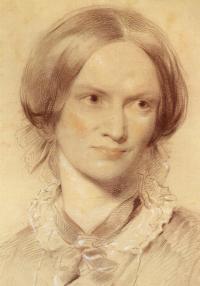
Charlotte Brontë
Thanks to Evelyn Roth, we are able to present a real historical phrenological examination of the well-known author Charlotte Brontë (1816-1855).
This examination was performed on June 29, 1851, by London Phrenologist Dr. Browne. Charlotte represented herself as Mrs. Fraser. Dr. Browne therefore could not know who she really was.

—Temperament for the most part nervous. Brain large, the anterior and
superior parts remarkably salient. In her domestic relations this lady
will be warm and affectionate. In the care of children she will evince
judicious kindness, but she is not pleased at seeing them spoiled by over-indulgence.
Her fondness for any particular locality would chiefly rest upon the associations
connected with it. Her attachments are strong and enduring- indeed, this
is a leading element of her character; she is rather circumspect, however,
in the choice of her friends, and it is well that she is so, for she will
seldom meet with persons whose dispositions approach the standard of excellence
with which she can entirely sympathise. Her sense of truth and justice
would be offended by any dereliction of duty, and she would in such cases
express her disapprobation with warmth and energy; she would not, however,
be precipitate in acting thus, and rather than live in a state of hostility
with those she could wish to love, she would depart from them, although
the breaking off of friendship would be to her a source of great unhappiness.
The careless and unreflecting, whom she would labour to amend, might deem
her punctilious and perhaps exacting: not considering that their
amendment and not her own gratification prompted her to admonish. She is
sensitive and anxious to succeed in her undertakings, but is not so sanguine
as to the probability of success. She is occasionally inclined to take
a gloomier view of things than perhaps the facts of the case justify. She
should guard against the effect of this where her affection is engaged,
for her sense of her own importance is moderate and not strong enough to
steel her heart against disappointment; she has more firmness than self-reliance,
and her sense of justice is of very high order. She is deferential to the
aged and those she deems worthy of respect, and possesses much devotional
feeling, but dislikes fanaticism and is not given to belief in supernatural
things without questioning the probability of their existence.
Money is not her idol, she values it merely for its uses; she would
be liberal to the poor and compassionate to the afflicted, and when friendship
calls for her aid she would struggle even against her own interest to impart
the required assistance- indeed, sympathy is a marked characteristic of
this organisation.
Is fond of symmetry and proportion, and possesses a good perception
of form, and is a good judge of colour. She is endowed with keen perception
of melody and rhythm. Her imitative powers are good, and the faculty which
gives manual dexterity is well developed. These powers might have been
cultivated with advantage. Is a fair calculator, and her sense of order
and arrangement is remarkably good. Whatever this lady has to settle or
arrange will be done with precision and taste.
She is endowed with an exalted sense of the beautiful and ideal, and
longs for perfection. If not a poet her sentiments are poetical or are
at least imbued with that enthusiastic glow which is characteristic of
poetical feeling. She is fond of dramatic literature and drama, especially
if it be combined with music.
In its intellectual development this head is very remarkable. The forehead
is at once very large and well formed. It bears the stamp of deep thoughtfulness
and comprehensive understanding. It is highly philosophical. It exhibits
the presence of an intellect at once perspicacious and perspicuous. There
is much critical sagacity and fertility in devising resources in situations
of difficulty, much originality, with a tendency to speculate and generalise.
Possibly this speculative bias may sometimes interfere with the practical
efficiency of some of her projects. Yet since she has scarcely an adequate
share of self-reliance, is not sanguine as to the success of her plans,
there is reason to suppose that she would attend more closely to particulars,
and thereby prevent the unsatisfactory results of hasty generalisation.
This lady possesses a fine organ of language, and can, if she has done
her talents justice by exercise, express her sentiments with clearness,
precision, and force- sufficiently eloquent but not verbose. In learning
a language she would investigate its spirit and structure. The character
of the German language would be well adapted to such an organisation. In
analysing the motives of human conduct, this lady would display originality
and power, but in her mode of investigating mental science she would naturally
be imbued with a metaphysical bias; she would perhaps be sceptical of the
truth of Gale´s doctrine. But the study of this doctrine, this new
system of mental philosophy, would give additional strength to her excellent
understanding by rendering it more practical, more attentive to particulars,
and contribute to her happiness by impairing to her more correct notions
of the dispositions of those whose acquaintance she may wish to cultivate."
This description is considered surprisingly accurate but for two points: CB was very superstitious and believed easily in supernatural things. She learned German but could never reach an even average competence of the language whereas she excelled in French.
"Gale's doctrine" is supposed to be a misspelling for "Gall's doctrine".
Disclaimer:
No one but the author of these pages
accounts
for their contents.